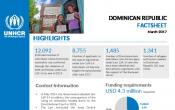United States of America Regional Office
The UNHCR’s Regional Office in Washington covers operations in the United States, 15 Caribbean states and 9 overseas territories including Antigua and Barbuda, the Bahamas, Barbados, Belize, Dominica, Dominican Republic, Grenada, Guyana, Haiti, Jamaica, St. Kitts and Nevis, St. Lucia, St. Vincent and the Grenadines, Suriname and Trinidad and Tobago; the British overseas territories of Anguilla, Bermuda, British Virgin Islands, Cayman Islands, Montserrat and Turks and Caicos Islands; and the Dutch overseas territories of the Kingdom of the Netherlands: Aruba, Curacao and Sint Maarten.
Operation: United States of America Regional Office
Location
Latest update of camps and office locations 21 Nov 2016. By clicking on the icons on the map, additional information is displayed.
Key Figures
| 2018 planning figures | |
| 70% | of applicants will have access to status determination procedures |
| 60% | of reception conditions will meet minimum standards |
| 55% | of stateless persons will be naturalized |
| 2016 end-year results | |
| 500 | asylum and refugee officers were trained, representing, a 112 per cent increase from the previous year |
| 37 | refugees departed via resettlement from four countries in the region |
| 33 | cases (44 people) were submitted for resettlement to three different resettlement countries by the Regional Office |
People of Concern
2016
| 2016 | 824,071 |
| 2015 | 696,796 |
| 2014 | 667,000 |

United States of America Regional Office
- 2016
- 2017
- 2018
Year-end Overview
Plan Overview
Working environment
Over the past year, there has been a considerable shift in UNHCR’s operating environment in the United States of America. The results of the November 2016 US elections resulted in uncertainty for UNHCR, in terms of refugee policy, protection, and funding, with implications on UNHCR’s global operations. At the same time, instability in Central and South America has prompted large mixed migration movements northwards, presenting new protection challenges for both the United States of America and the Caribbean. UNHCR will continue working closely with the US government to maintain political and financial support for UNHCR’s global programmes, in order to ensure access to solutions and promote favourable protection environment for all populations of concern to UNHCR, in the region and beyond. At the close of 2017, the United States remains UNHCR’s largest financial contributor and largest refugee resettlement country.
In the Caribbean, UNHCR will intensify its emergency preparedness and response to larger refugee influxes from South America. UNHCR will also continue to respond to the needs of refugees in mixed movements. This will require strengthening of asylum and refugee status determination (RSD) capacity, complemented by community-based protection initiatives in key countries throughout the region, such as Trinidad and Tobago, and the promotion of protection sensitive migration systems through regular engagement with relevant national authorities and IOM. UNHCR will further promote local integration in some of the larger Caribbean countries, while continuing to facilitate resettlement for refugees with specific or urgent protection needs. In Trinidad and Tobago, the progressive transfer of RSD responsibilities from UNHCR to the Government will continue to be advanced through the quality assurance initiative.
In the Dominican Republic, UNHCR will continue to pursue nationality solutions for people of foreign descent. In Haiti, UNHCR will close its office in 2018, but ensure continued engagement with the Government, in particular to provide technical assistance for the implementation of the international statelessness conventions (following Haiti’s accession in 2017) and the adoption of a new nationality law.
UNHCR will maintain and enhance advocacy partnerships with the United States-based national and international NGOs, multilateral organizations (including the World Bank), and in particular with the two main NGO coalitions (InterAction and Refugee Council USA) as well as with other informal working groups and with individual NGOs—many of whom are invaluable advocacy partners for UNHCR.
In the Caribbean, the successful creation of the Caribbean Migration Consultations in 2016 with the support of UNHCR and IOM, provides a new regional forum to address challenges related to mixed movement and develop consistent and protection-sensitive responses across the region, to advance on implementation of the commitments made by States in the Brazil Plan of Action. UNHCR is also formalizing its cooperation with CARICOM’s Implementing Agency for Crime and Security (IMPACS) and cooperating on several capacity-building efforts.
UNHCR works closely with Church World Service to implement the resettlement deployment scheme for the Caribbean region and also as the implementing partner for the Refugee Congress funding.
Key priorities
In 2018 UNHCR will focus on:
- Maintaining political and financial support of the United States Government for UNHCR global programmes (including through proactive engagement with the new Administration and new congressional offices) to maximize access worldwide to effective protection and solutions for beneficiary populations;
- Raising public awareness of priority issues of concern to UNHCR;
- Promoting favorable protection environments in the United States of America and in the Caribbean countries for all people of concern to UNHCR.









